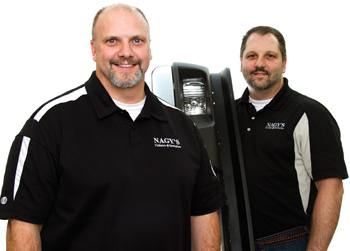 As we mentioned in the cover story of this month’s BodyShop Business, the greatest idea we ever had to catapult our business to the next level was to open a second location. We figured this might be the way the industry was going, and we were right.
As we mentioned in the cover story of this month’s BodyShop Business, the greatest idea we ever had to catapult our business to the next level was to open a second location. We figured this might be the way the industry was going, and we were right.
The third location came about when a dealer contacted us out of the blue and asked if we wanted to run a body shop at his location. The ensuing locations were pursued by us.
With our recent growth in the last six years or so, I’ve been asked over and over, “How big are you guys going to get?” So I thought I would explain why we expanded to eight locations and didn’t stay as a small family business.
My dad, Dave Nagy (or Pop as we call him), started the business in 1973 in Doylestown, Ohio, behind our house for the sake of convenience and customer service. He really understood what it meant to take care of the customer. From there, the business grew and grew.
As my brother Dan and I took over, we had people driving miles and miles to come to Doylestown to have their cars, vans and trucks repaired.
In 2006, we decided to make it convenient for the Wooster and surrounding communities by opening a location there. A couple years later, we were approached by Kirk Spurgeon of Spurgeon Chevrolet (formally Red Ferris Chevrolet), who wanted to partner with us and bring the Nagy’s process and culture into his building. That started a string of reactions from other dealership owners and some independents, some of whom were ready to retire or just wanted to be part of a bigger team.
Nagy’s process and culture is simply the UCE (Ultimate Customer Experience), which comprises all of our policies, processes and documents. Simplified, it’s the “customer is always first” culture. Dan and I, with the help of many of our staff, built a complete repair process with standard operating procedures (SOPs) so that the repairs and quality would be the same as they were when Pop ran the store back in the 1970s and ‘80s. The SOPs are one part of the UCE, which spells out the “perfect repair” – from how we want to answer the phones, to greeting people, to final billing paperwork.
From the metals and plastics to the electronic controls, the vehicles have changed dramatically. But one thing we’ve remained consistent on is the customer service culture that Pop used to jump-start the business.
Lessons Learned
1. Don’t outrun your administration.
2. When you think you’re organized, organize some more.
3. Many minds make better decisions.
4. Make sure you have at least some DRPs or relationships so you have work coming in from the start – even if it’s slow.
5. Quality standards must be held very high – no exceptions.
6. Communication, no matter how painful, must be direct and timely.
7. Buy-in from all involved is paramount.
8. Get all the facts, not opinions, that you possibly can before making decisions.
9. Location, location, location.
10. The harder you work and the more you know you can, the more you can.
Mistakes
1. Not having DRPs or relationships set up ahead of time.
2. Not communicating quickly and precisely on problems with processes or personnel.
3. Not working smart enough.
4. Not having one of our people in a decision-making position exemplify our culture.
Brilliant Moves
1. Asking questions of persons smarter than myself – sometimes from outside the industry.
2. Owning up to our mistakes.
3. Viciously defending our reputation.
4. Being born from parents who handed down an amazing legacy (we had nothing to do with this, but still…).
5. Getting involved with the community (schools, Chamber of Commerce, businesses and charities).
Ron and Dan Nagy are co-owners of Nagy’s Collision Repair Specialists. They can be reached at [email protected] or [email protected].













